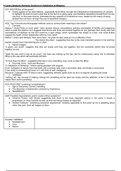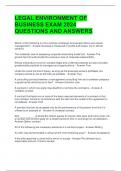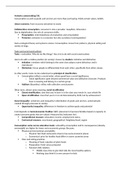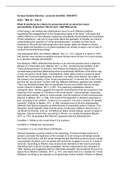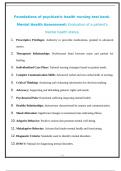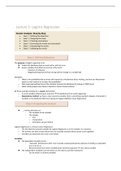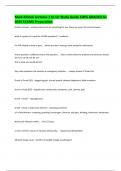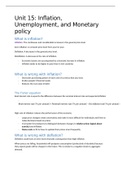NOTES ON CHAPTER 1
CHAPTER 1.1
Socrates (470-399 B.C.) posed the question “What is knowledge?” to young mathematician
Theaetetus.
➢ This kicked off the history of:
→ The philosophy of science
→ The philosophy of knowledge, or Epistemology
➢ This question and related questions are not yet answered
→ How can we justify knowledge?
→ What is the ultimate source of knowledge?
→ What is the method by which we gain knowledge?
❑ Two rival approaches to the questions:
➢ Rationalism
→ True knowledge about reality derives from the proper use of our reasoning
capacities (intellect, reason or ratio).
→ Rationalists argue that our capacity to think generates ideas and concepts which
we cannot arrive at by using our sensory capacities alone. (Based on the work of
the ancient Greek philosopher Plato).
➢ Empiricism
→ Not reason but sense experience is the ultimate source of knowledge.
→ For knowledge one must rely on empirical facts (This was the idea of Plato’s
pupil, Aristotle).
❑ Plato and Aristotle were immensely influential in the Middle Ages
➢ The Scientific Revolution discredited many of their ideas.
➢ Rationalism and Empiricism lived on in new guises after the Scientific Revolution
(Modern Rationalism and Empiricism).
,CHAPTER 1.2
❑ Plato (427-347 B.C.): the famous pupil of Socrates and the first philosopher who is usually
classified as a rationalist.
❑ Socrates
➢ He asked questions about what it takes to live well through his method: dialectic, or
cross-examination. This method of ‘Q & A’ as intellectual midwifery (?) had the main
objective to assist others by asking questions in order to give birth to true ideas.
➢ He claimed that not knowing was his only certainty, he asked people questions about
things they claimed to know for sure. His goal was to have them rethink their opinions.
➢ He examined concepts like beauty, justice, courage, love, truth and knowledge to
determine their essences, their unique identifying properties, shared by all instances.
➢ He was popular with the youth, but he made enemies with those in power. In a jury of
500 citizens, Socrates was sentenced to death for corrupting the youth. No works by
Socrates have survived.
❑ Plato's Metaphysics and epistemology
➢ Metaphysics: the branch of philosophy that asks and tries to answer the pre-eminent
philosophical questions:
→ Why is there something rather than nothing?
→ What is the world made of?
➢ The investigation into these questions is also called ontology.
❑ Philosophers were engaged in fierce debates about what exists and what does not.
➢ Central issue: the difference between being and becoming.
❑ Heraclites
➢ Convinced that change – or flux as he called it – is at the heart of existence
→ We can only truthfully claim that nothing is; everything becomes. This
view is sometimes captured in the form of the aphorism ‘panta rei’ -
everything flows.
➢ Not much of his work has survived.
➢ He claims that due to the ever- changing nature of appearances, most people are not
able to attain knowledge. They are like sleepwalkers. Only those few people who are
capable of grasping the hidden and fundamental law, or Logos, behind appearances can
be said to arrive at knowledge.
,❑ Parmenides
➢ For him, it is their senses that misled human beings into thinking that things are
changing all the time.
➢ He claims that we may be inclined to believe that reality is changing all the time, but
appearances are deceptive. Something cannot come from, or dissolve into, nothing.
➢ He underlies all the change and movement that we pick up with our senses, there is a
permanent and unchanging reality. This reality is indivisible, immutable and
imperishable.
➢ Nothing ever really changes: if something changes, it no longer is. Ultimately, everything
is, nothing becomes.
→ Hence, knowledge pertains to a hidden order beyond transient
appearances. We must rely on reason to discover the unchanging truths
about eternal reality.
❑ The debate amongst Parmenides and Heraclites is a metaphysical discussion about the
distinction between appearance and reality.
➢ For Parmenides being is real, and change is not
➢ For Heraclites change is real and being is not.
➢ These are defined epistemological issues: issues having to do with the Socratic question,
what is knowledge?
❑ Plato held Parmenides and Heraclites in high esteem.
➢ He endorsed the claim defended by Heraclites and Cratylus that the world of the senses
is in perpetual flux: everything flows.
➢ He argued that if we thus equate knowledge with perception, the allegedly fluctuating
nature of the perceptual world has devastating implications. Genuine knowledge will in
that case be impossible.
➢ Knowledge becomes relative to the observer and his own perceptions and beliefs.
❑ Protagoras (490-420 B.C.)
➢ ‘Man is the measure of all things’
➢ He claimed that ‘individual things are for me such as they appear to me, and for you in
turn as they appear to you.’
➢ His homo mensura doctrine implied ‘that opinion is true to each person which he
acquires through sensation.’ In that case, no one can ever be wrong about anything.
❑ Heraclites and Protagoras: truth is in the eye of the beholder. But this is plainly absurd, as it
precludes the possibility of investigation and criticism of opinions.
➢ For Plato this Protagorean relativity of truth and knowledge was an unacceptable
conclusion: Truth and knowledge (episteme) are about how things really are, not about
how they are for me or for you.
➢ Therefore, knowledge is not perception, because this definition sends you down a
slippery slope towards a relativism everyone and everything all have their own stock of
opinions. This shows that for knowledge we cannot appeal to the evidence of
observation, given the perpetual flux.
, ❑ Plato sided to a great extent with Parmenides because in his view being is perfect, which implies
that it has to be unchangeable.
➢ He believed that the real world cannot be the ever-changing world of appearances, but
a supernatural realm which contains the eternal and perfect Forms (= Ideas).
➢ He explained his metaphysics using an allegory of human existence – the famous
allegory of the cave. According to Plato, human beings contenting themselves with
observations of the world as it appears to them by sensory experience mistake
appearance for reality. Their souls are imprisoned in their bodies and they think that
whatever they perceive with their sense organs must be the real world. We must learn
to ‘see’ behind the appearances into the world of Forms. The universal Forms are the
ultimate realities that ground true knowledge.
❑ Empirical investigation is inadequate for knowledge as it only brings us into contact with a
reality that is in constant Heraclitean flux. The facts we perceive are wildly diverse and
continuously changing. Hence, the operation of the senses results in mere belief (doxa) and not
knowledge (episteme)
❑ According to Plato, because the Forms belong to a supernatural world (cannot be physically
perceived), but we can gain knowledge about this transcendental reality through our capacity
for reasoning.
➢ For Plato, human reason constitutes the source of knowledge, which makes him a
rationalist. Plato also subscribes to nativism, the doctrine that human beings possess
innate (inborn) ideas: knowledge states that we already possess at birth. This means
that insofar as we have such ideas, we do not have to rely on our senses for knowledge.
➢ Plato even said that we are all born possessing all knowledge, which was lost at birth,
but we are able to remember it all, if we only use our reason correctly.
→ Plato claimed that to learn is to remember, so that there is no such
thing as new knowledge.
➢ Plato’s theory about reincarnation: The immortal soul belongs to the World of Forms,
where it has seen them all, but we forgot about them when our souls were born into
our bodies.
→ Plato explains how knowledge possessed in the soul's previous
existence in the World of Forms can be recollected. Learning-by-
recollection (anamnesis)
CHAPTER 1.1
Socrates (470-399 B.C.) posed the question “What is knowledge?” to young mathematician
Theaetetus.
➢ This kicked off the history of:
→ The philosophy of science
→ The philosophy of knowledge, or Epistemology
➢ This question and related questions are not yet answered
→ How can we justify knowledge?
→ What is the ultimate source of knowledge?
→ What is the method by which we gain knowledge?
❑ Two rival approaches to the questions:
➢ Rationalism
→ True knowledge about reality derives from the proper use of our reasoning
capacities (intellect, reason or ratio).
→ Rationalists argue that our capacity to think generates ideas and concepts which
we cannot arrive at by using our sensory capacities alone. (Based on the work of
the ancient Greek philosopher Plato).
➢ Empiricism
→ Not reason but sense experience is the ultimate source of knowledge.
→ For knowledge one must rely on empirical facts (This was the idea of Plato’s
pupil, Aristotle).
❑ Plato and Aristotle were immensely influential in the Middle Ages
➢ The Scientific Revolution discredited many of their ideas.
➢ Rationalism and Empiricism lived on in new guises after the Scientific Revolution
(Modern Rationalism and Empiricism).
,CHAPTER 1.2
❑ Plato (427-347 B.C.): the famous pupil of Socrates and the first philosopher who is usually
classified as a rationalist.
❑ Socrates
➢ He asked questions about what it takes to live well through his method: dialectic, or
cross-examination. This method of ‘Q & A’ as intellectual midwifery (?) had the main
objective to assist others by asking questions in order to give birth to true ideas.
➢ He claimed that not knowing was his only certainty, he asked people questions about
things they claimed to know for sure. His goal was to have them rethink their opinions.
➢ He examined concepts like beauty, justice, courage, love, truth and knowledge to
determine their essences, their unique identifying properties, shared by all instances.
➢ He was popular with the youth, but he made enemies with those in power. In a jury of
500 citizens, Socrates was sentenced to death for corrupting the youth. No works by
Socrates have survived.
❑ Plato's Metaphysics and epistemology
➢ Metaphysics: the branch of philosophy that asks and tries to answer the pre-eminent
philosophical questions:
→ Why is there something rather than nothing?
→ What is the world made of?
➢ The investigation into these questions is also called ontology.
❑ Philosophers were engaged in fierce debates about what exists and what does not.
➢ Central issue: the difference between being and becoming.
❑ Heraclites
➢ Convinced that change – or flux as he called it – is at the heart of existence
→ We can only truthfully claim that nothing is; everything becomes. This
view is sometimes captured in the form of the aphorism ‘panta rei’ -
everything flows.
➢ Not much of his work has survived.
➢ He claims that due to the ever- changing nature of appearances, most people are not
able to attain knowledge. They are like sleepwalkers. Only those few people who are
capable of grasping the hidden and fundamental law, or Logos, behind appearances can
be said to arrive at knowledge.
,❑ Parmenides
➢ For him, it is their senses that misled human beings into thinking that things are
changing all the time.
➢ He claims that we may be inclined to believe that reality is changing all the time, but
appearances are deceptive. Something cannot come from, or dissolve into, nothing.
➢ He underlies all the change and movement that we pick up with our senses, there is a
permanent and unchanging reality. This reality is indivisible, immutable and
imperishable.
➢ Nothing ever really changes: if something changes, it no longer is. Ultimately, everything
is, nothing becomes.
→ Hence, knowledge pertains to a hidden order beyond transient
appearances. We must rely on reason to discover the unchanging truths
about eternal reality.
❑ The debate amongst Parmenides and Heraclites is a metaphysical discussion about the
distinction between appearance and reality.
➢ For Parmenides being is real, and change is not
➢ For Heraclites change is real and being is not.
➢ These are defined epistemological issues: issues having to do with the Socratic question,
what is knowledge?
❑ Plato held Parmenides and Heraclites in high esteem.
➢ He endorsed the claim defended by Heraclites and Cratylus that the world of the senses
is in perpetual flux: everything flows.
➢ He argued that if we thus equate knowledge with perception, the allegedly fluctuating
nature of the perceptual world has devastating implications. Genuine knowledge will in
that case be impossible.
➢ Knowledge becomes relative to the observer and his own perceptions and beliefs.
❑ Protagoras (490-420 B.C.)
➢ ‘Man is the measure of all things’
➢ He claimed that ‘individual things are for me such as they appear to me, and for you in
turn as they appear to you.’
➢ His homo mensura doctrine implied ‘that opinion is true to each person which he
acquires through sensation.’ In that case, no one can ever be wrong about anything.
❑ Heraclites and Protagoras: truth is in the eye of the beholder. But this is plainly absurd, as it
precludes the possibility of investigation and criticism of opinions.
➢ For Plato this Protagorean relativity of truth and knowledge was an unacceptable
conclusion: Truth and knowledge (episteme) are about how things really are, not about
how they are for me or for you.
➢ Therefore, knowledge is not perception, because this definition sends you down a
slippery slope towards a relativism everyone and everything all have their own stock of
opinions. This shows that for knowledge we cannot appeal to the evidence of
observation, given the perpetual flux.
, ❑ Plato sided to a great extent with Parmenides because in his view being is perfect, which implies
that it has to be unchangeable.
➢ He believed that the real world cannot be the ever-changing world of appearances, but
a supernatural realm which contains the eternal and perfect Forms (= Ideas).
➢ He explained his metaphysics using an allegory of human existence – the famous
allegory of the cave. According to Plato, human beings contenting themselves with
observations of the world as it appears to them by sensory experience mistake
appearance for reality. Their souls are imprisoned in their bodies and they think that
whatever they perceive with their sense organs must be the real world. We must learn
to ‘see’ behind the appearances into the world of Forms. The universal Forms are the
ultimate realities that ground true knowledge.
❑ Empirical investigation is inadequate for knowledge as it only brings us into contact with a
reality that is in constant Heraclitean flux. The facts we perceive are wildly diverse and
continuously changing. Hence, the operation of the senses results in mere belief (doxa) and not
knowledge (episteme)
❑ According to Plato, because the Forms belong to a supernatural world (cannot be physically
perceived), but we can gain knowledge about this transcendental reality through our capacity
for reasoning.
➢ For Plato, human reason constitutes the source of knowledge, which makes him a
rationalist. Plato also subscribes to nativism, the doctrine that human beings possess
innate (inborn) ideas: knowledge states that we already possess at birth. This means
that insofar as we have such ideas, we do not have to rely on our senses for knowledge.
➢ Plato even said that we are all born possessing all knowledge, which was lost at birth,
but we are able to remember it all, if we only use our reason correctly.
→ Plato claimed that to learn is to remember, so that there is no such
thing as new knowledge.
➢ Plato’s theory about reincarnation: The immortal soul belongs to the World of Forms,
where it has seen them all, but we forgot about them when our souls were born into
our bodies.
→ Plato explains how knowledge possessed in the soul's previous
existence in the World of Forms can be recollected. Learning-by-
recollection (anamnesis)


